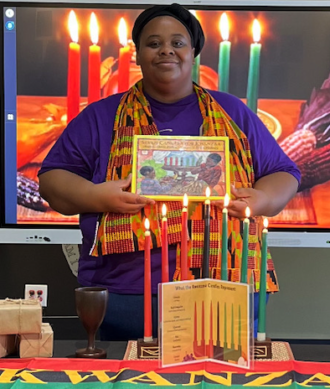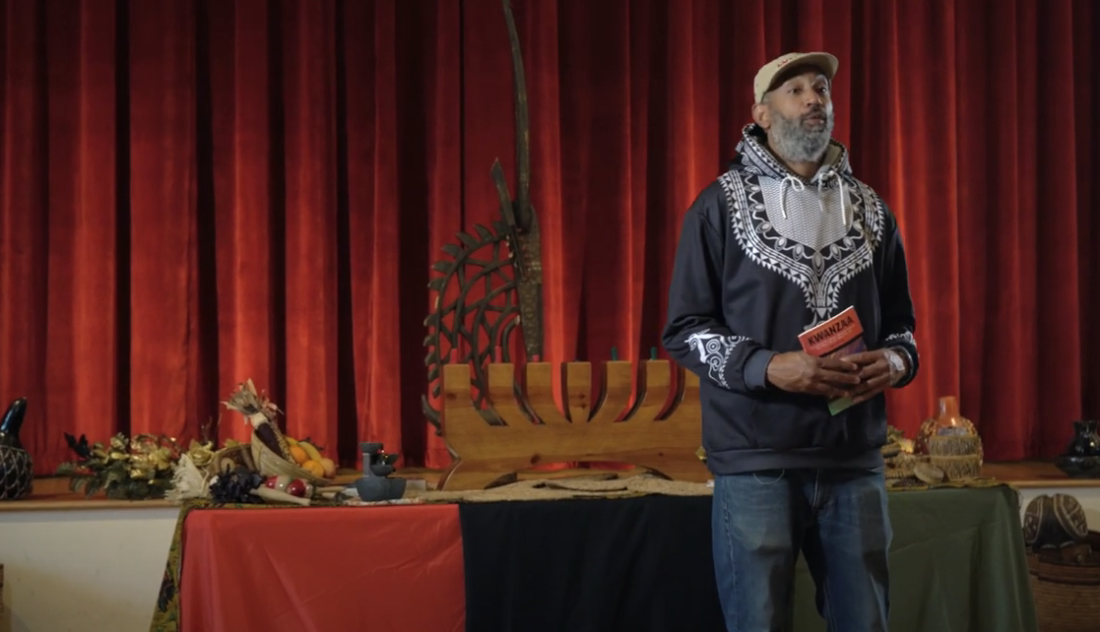As a child in Philadelphia, Nex Millen took part in Kwanzaa traditions each December: lighting candles, exchanging inexpensive gifts, singing, sharing a feast.
“I grew up in a household that was Christian, but we still celebrated Kwanzaa,” says Millen, an Asheville-based hip-hop DJ, artist and producer. “Most people get it mixed up and think it’s a religious holiday, but it can be celebrated by many people of all backgrounds. It builds character in people that celebrate.”
When Millen moved to Asheville nine years ago, he discovered the annual celebration of African American culture was not widely understood in Western North Carolina. “There’s just not a lot of knowledge, and there’s a lot of misinformation,” he explains. “I’ve talked to people, and they swear up and down that it’s a replacement for Christmas. It falls after Hanukkah, it falls after Christmas. You can celebrate it without disrupting your other holidays.”
As a member of the YMI Cultural Center board of directors, Millen is helping lead efforts to raise local awareness of Kwanzaa. Likewise, Hendersonville writer and activist Crystal Cauley wants to educate people about the holiday through the WNC Kwanzaa Collective, which she founded in 2021.
“It’s important because it’s a seven-day observance that brings families together, communities together,” Cauley says. “And with so much going on in African American communities across this country, we really need to observe Kwanzaa. I want my family and friends to observe it, for us to have that time to self-reflect.”
This year, Kwanzaa runs Tuesday, Dec. 26-Monday, Jan. 1.
The YMI Cultural Center, which held its first Kwanzaa observance in 1988, went virtual in 2020 by producing educational videos highlighting the holiday and its seven principles. The video series Kwanzaa 365 explores the principles through discussions, musical performances and poetry.
Because the center is being renovated, the virtual celebration has remained in place for the last few years, with plans to go back to in-person in 2024, Millen says.
And the WNC Kwanzaa Collective has plans for Hendersonville throughout December.
Seven principles
Kwanzaa was created in 1966 by activist and academic Maulana Karenga, who modeled it on “first fruit” harvest festival traditions from parts of West and Southeast Africa. He said his goal was to “give Blacks an alternative to the existing holiday and give Blacks an opportunity to celebrate themselves and their history, rather than simply imitate the practice of the dominant society.” In later years, he changed his stance somewhat, saying Kwanzaa was not meant to replace Christmas or other religious holidays.
During the week of Kwanzaa, families and communities typically come together to share a feast, honor their ancestors, affirm bonds and celebrate African and African American culture. Tables are decorated with symbols such as the Kinara (candle holder), Mkeka (mat), Muhindi (corn), Mazao (fruit) and Zawadi (gifts).
Each day, celebrants light a candle to highlight the principle of that day: Umoja (unity), Kujichagulia (self-determination), Ujima (collective work and responsibility), Ujamaa (cooperative economics), Nia (purpose), Kuumba (creativity) and Imani (faith).
“I can connect with all seven principles in my life,” Cauley says. “And so even though it’s for those seven days, my goal is to have people live the principles throughout the year. There is an emphasis, especially for African Americans, to really focus on themselves and how we can unite instead of being divided.”
Millen adds: “I believe it would make anybody, not just Black people, a better person if they were to practice [the principles] every day and then celebrate at the end of the year.”
Cauley, who founded the Black Business Network of WNC in 2016, says her favorite principle is Ujamaa, which focuses on cooperative economics on the holiday’s fourth day.
“We want to support Black-owned businesses and to lift each other up,” she says. “And so Ujamaa means to build and maintain our own stores, shops and other businesses and to profit from them together.”
Kwanzaa started to gain popularity and mainstream acceptance in the 1980s and ’90s. The YMI Cultural Center first observed the holiday in 1988, in conjunction with Asheville’s Light Up Your Holiday event, with a candle lighting ceremony, gospel music from the Asheville Concert Choir and a drum and dance performance, according to contemporary reports in the Asheville Citizen-Times.
Raising awareness in WNC
But despite the efforts of YMI and others over the years, Kwanzaa has not gained a foothold in WNC the way it has in other places, Cauley asserts. A big reason for that, she says, is that the Black population is small compared with other parts of the state. “If you look at Henderson County, it’s less than 4,000 Black people here [in a county of more than 115,000]. So you have people that may not know much about it, but if you go outside of Western North Carolina to a major city, it’s heavily celebrated.”

Unlike Millen, Cauley did not grow up celebrating Kwanzaa. She became interested after attending a celebration organized by the Rev. DeBorah Shelton Ogiste of Unity of the Blue Ridge in Mills River about a decade ago. “I just fell in love with it from that point and celebrated it, and had my children celebrate it too,” she says.
Two years ago, Cauley founded the WNC Kwanzaa Collective as part of her ongoing efforts to preserve African American history in the region. She also has organized local Black History Month and Juneteenth events and written a spoken-word poem about the history of slavery in Henderson County.
Her efforts to raise awareness have also included reaching out to businesses to encourage them to recognize the holiday and other Black cultural events by, for instance, having a sale or simply putting up “Happy Juneteenth” or “Happy Kwanzaa” signs.
“We can look at what other cities have been doing for decades,” Cauley says. “You can have a holiday market, have an exhibit, do a story time. Say ‘Happy Kwanzaa’ the same way we say ‘Merry Christmas.’ There’s many ways that we can educate ourselves and participate in different cultures.”
In 2021, Cauley convinced the mayors of Asheville, Hendersonville, Brevard and Fletcher to issue proclamations acknowledging Dec. 26-Jan. 1 as Kwanzaa Week. The collective also sponsored a monthlong Kwanzaa display at Henderson County’s main library and held a virtual celebration at the Hands On! Children’s Museum in Hendersonville.
This year, Cauley has organized events in Hendersonville:
- On Thursday, Dec. 14, 7 p.m, Poetic Versers of Color, a group consisting of Cauley, Tony Robles and Robert Zachary, will perform at the Shakedown Lounge Kava Bar. The event will include a Kwanzaa exhibit and Kwanzaa-themed poetry readings;
- On Wednesday, Dec. 27, 10:30 a.m., Cauley will be at The People’s Museum for Kwanzaa Story Hour and Craft.
The YMI, meanwhile, is encouraging people to check out its Kwanzaa 365 videos, which include educational segments, musical performances from local soul singer Lyric and others, readings, candle lightings and more.
“The videos are very in-depth and celebrate all seven days of Kwanzaa, so you will want to watch it from No. 1 to the end,” Millen says. “It’s something that you can get together with your family and enjoy, and it’s about as long as watching an episode of your favorite sitcom.”
Millen was aware of the YMI’s Kwanzaa celebrations but didn’t participate until he joined the center’s board. When the pandemic hit, he and others decided to create the videos in order to keep the tradition from dying off.
“Kwanzaa is significant to me because it’s the celebration of the things that we’ve done all year. Going over the principles, doing the rituals, all these things build character in a person, I believe. I’m thankful to be able to celebrate it all my life.”



Before you comment
The comments section is here to provide a platform for civil dialogue on the issues we face together as a local community. Xpress is committed to offering this platform for all voices, but when the tone of the discussion gets nasty or strays off topic, we believe many people choose not to participate. Xpress editors are determined to moderate comments to ensure a constructive interchange is maintained. All comments judged not to be in keeping with the spirit of civil discourse will be removed and repeat violators will be banned. See here for our terms of service. Thank you for being part of this effort to promote respectful discussion.